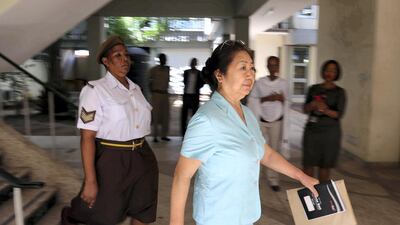A Tanzanian court on Tuesday sentenced a Chinese woman dubbed the "Ivory Queen" to 15 years in prison for her role in trafficking tusks from more than 400 elephants.
Yang Fenlan, 69, was convicted in Dar es Salaam of trafficking 706 tusks between 2000 and 2014, a haul representing the slaughter of dozens of herds of elephants.
She was known as one of the most notorious smugglers in Africa. She is believed to have illegally smuggled ivory worth around $2.5 million, using her connections to the Chinese and Tanzanian elite to transport ivory globally.
Prosecutors said Glan "intentionally did organise, manage and finance a criminal racket by collecting, transporting or exporting and selling government trophies" weighing a total of 1.889 tonnes.
Two Tanzanian men were also found guilty for their role in the illegal commerce and sentenced to 15 years in prison. All three were charged on convictions of leading an organised criminal gang.
"The prosecution proved the case against the accused beyond a reasonable doubt," Judge Huruma Shaidi told the court.
He ordered all three to pay twice the market value of the turks of face adding another two years to their prison sentences.
Wildlife campaigners have called it one of the most important cases for several years.
Fenlan, who has lived in the East African nation since the 1970s, was convicted of organising a smuggling ring between Tanzania and Asia.
When she was arrested in 2015 she was vice president of the China-Africa Business Council of Tanzania.
Poaching has seen the population of African elephants fall by 110,000 over the past decade to just 415,000 animals, according to the International Union for Conservation of Nature (IUCN). Tanzania's elephant population shrank from 110,000 in 2009 to little more than 43,000 in 2014, according to a 2015 census.
The slaughter is being fuelled especially by demand in Asia, where ivory is used for jewellery and ornamentation.
Pams Foundation, a non-profit organisation, said that the conviction was a testament to the Tanzanian government’s tough stance of traffickers.
’The government is taking wildlife trafficking very seriously, and an attack on Tanzania’s wildlife is seen as an attack on Tanzania. None of this would have been possible were it not for the political will of the President, John Magufuli, and his drive to stop wildlife crime and corruption,” said Krissie Clark, executive director and co-founder of Pams.
“Tourism is a big income generator for the country, thus it is essential that Tanzania’s multi-agency intelligence-led enforcement approach persists to ensure this country's magnificent elephants can continue to roam freely.”
Her case is one of several high-profile cases to be have been prosecuted in Tanzanian courts in recent years.
In 2014, a Chinese national was arrested at Dar es Salaam port for the illegal possession of 81 elephant tusks weighing 303 kilogrammes and pangolin scales of about 2 kg. He was ordered to pay a fine of $6.5 million but was eventually sentenced to 20 years in prison after failing to pay the fine.
Two Chinese nationals were arrested and sentenced to 30 years in prison each in July 2018 after they were caught with 706 ivory tusks.
A Burundian national was sentenced to 12 years in prison in March 2017 for crimes connected to the illicit trade of trafficking animal parts.

